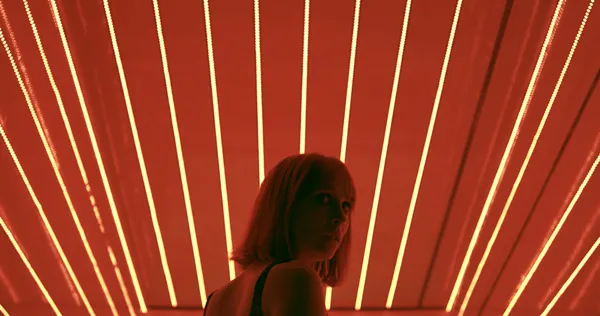 |
| Ingrid García Jonsson in Ana De Día |
Ana De Día (Ana By Day), showing as part of this year's Viva! Spanish and Latin American Film Festival, begins with one of those experiences that are vanishingly rare in real life but quite common in cinema: a woman discovering that she has a double. Then it does something quite different from other stories of its ilk, focusing on what its heroine goes on to do with her life. When director Andrea Jaurrieta agreed to talk about the film, I began by asking her if she felt that it was important to set aside concerns about why the double existed so that she could concentrate on less-explored themes about identity.
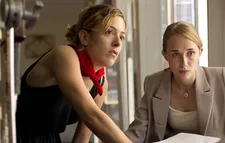 |
| Andrea Jaurrieta on the set of Ana De Día |
"Yes," she says. "The question about the double is just like a 'trigger' for the story. In fact there's kind of an ambiguity about this double: does she exist? Is it just the duplicity that everybody has inside? Answering to the main question of the film: 'what would you do if a double occupies your life?' I wanted to talk about the search of identity and limits of the main character. Ana is a good girl that always did what she was supposed to do but when she finds out that all her obligations are done by this double she stars asking herself for the first time: who is she actually? Was that life that she was living the life that she wanted to live? And in fact: what life would I like to live? Because I'm sure we wouldn't know what to do if we had a total freedom to choose. All these questions finally arrive to the spectator: are we living the lives that we want to live?"
Ana - or Nina, as she goes on to call herself - is quite a young woman. Is she still figuring out what she wants to do with her life, or does Andrea think that an older character could easily have made the same decisions?
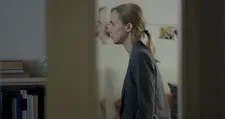 |
| Ana begins to suspect that something is amiss |
"No. It was important to create a character near the thirties. I think that's a moment in life in which you start asking yourself about everything and you are sure about nothing. I wanted to create a woman of my generation. I mean, I think we are a generation that grew up in a good moment: we could study what we wanted, we didn't want to be aware about what was going to be with us in the future because everything was easy. Suddenly, a huge crisis came when we were in our early twenties and for the first time we realised that what we had learnt, what our parents had told us that we should do to have a good life, was useless. So, suddenly we felt totally lost: what do we have to do in life? why do we have to follow up what our parents did if that brought us to a moment of no future? Who are we? Why can't we choose a different way of life? Ana/Nina is in that moment. She needs to discover herself for the first time."
At one point, Ana gets a job in a music hall where many of the acts are about the creation of new personas and the difference between who people are onstage and in their private lives. Was there an element of performance in Nina's life, or did she stop performing when she stopped living as Ana?
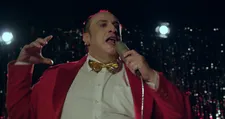 |
| The show must go on |
"Oh, what a good reflection about the Music Hall! About your question, as the film says on its beginning: 'The river is within us'. For me Ana will be always inside Nina and Nina will be an impulse inside Ana. We can't run away from ourselves. So both are real and a performance at the same time."
The film explores some of the ways in which identities are regulated by other people and institutions, not just for Nina but also for others, such as the immigrants that her landlady talks about. Was this a wider issue that Andrea wanted to comment on?
"For me every locations of the film are like bubbles where people that are running away from 'the day' (understanding the concept of day as the place of what is called normal, regulated life) or that once in the past ran away, to find peace," she says. "Time seems to be stopped in these places but that's why they feel safe. For me the big issue in my film is the need to run away from a reality, from the actuality, that is not as good as it should be. That's why it is called Ana By Day: Ana stays on that metaphoric 'day' while Nina tries to find freedom in the 'night' (that place that is full of outsiders).
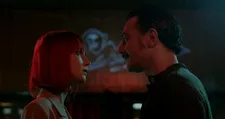 |
| Nina considers the choices open to her |
As Nina changes over time, she and her double become quite different characters. Was Andrea interested in exploring the way that the choices we make in life shape us as people?
"Yes of course, and I think that Ingrid [Jonsson] (the actress) understood it so good that the character makes a bigger trip than what I thought while writing it. I love the 'hero's trip' that Ana makes in the film."
How did she go about finding the right actress for such a complicated role?
"I saw Ingrid in her first film, called Beautiful Youth, by Jaime Rosales. I loved her work. She was very young and outstanding. Then I met her in the Academy Awards' party of that year, in which she was nominated as Best New Actress (and I had sneaked in). I started talking to her because we had some friends in common in the party, she read the script and I after that I made her do like three or four different castings until I was sure that she was the perfect Ana/Nina. And I made the good choice!"
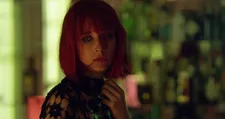 |
| A question of identity |
In some scenes we see Nina watching her double. Did she shoot with Ingrid in each position in turn, or were parts of those scenes filmed at different times so Ingrid could adjust to the different characters?
"We shot it separately because we didn't have money for a wig, so we had to cut and dye Ingrid's hair for real because it was cheaper. All Ana's shots were shot during the first week and then we started with Nina's part."
What's next for Andrea as a filmmaker?
"I'm trying to write a new story, but it's impossible to sit down quietly during the promotion of Ana By Day! This week I'm in UK, next week I have to be in 4 different cities of Spain and in April I go to Buenos Aires... I hope I can write in trains and planes. Oh my god...!"
Andrea will be doing audience Q&As following screenings of the film at the GFT in Glasgow on 25 March and the Watershed in Bristol on 26 March.





















